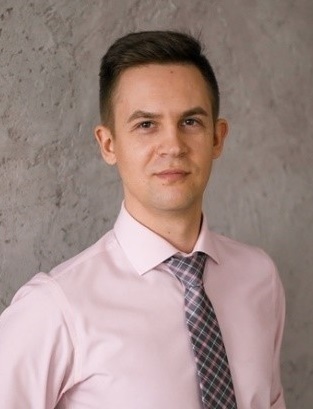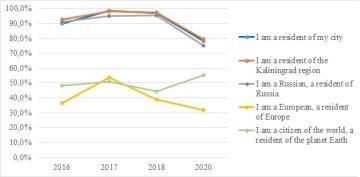Identity and historical memory of Kaliningrad citizens

Aleksandr Shchekoturov
Head
Sociological Lab, Immanuel Kant Baltic Federal University
Russia
The Kaliningrad region, due to the specifics of its geopolitical location, is in the zone of direct information and socio-cultural influence of the EU countries and the NATO military bloc. In this regard there may be ambiguous assessments of values and views the inhabitants share and how they identify themselves. This article presents the results of sociological studies carried out by the Immanuel Kant Baltic Federal University in 2016-2021. Data collected through representative surveys. Each survey involved at least 1000 residents of the Kaliningrad region aged 18 years and older.
Figure 1 shows the dynamics of territorial identity in 2016-2020. Respondents were asked the question: “How strongly do you identify with the specified categories”. Each item was rated on a scale from -2 (not at all) to +2 (completely identify). The figure shows the sum of the percentages of positive identification for each position.
Figure 1. Dynamics of the territorial identity of Kaliningrad citizens in 2016-2020

We can reveal three trends in the indicated period:
- Local, regional and national identities are the primary identification for the inhabitants of the Kaliningrad region.
- Identification with Russia, the Kaliningrad region and the city of their residence are equally important.
- European identity varies significantly among 30-50% of the region’s inhabitants, being the least significant among the proposed options.
It was revealed that the categories of socio-territorial identification positively correlate with each other. Two types of identity can be distinguished: pro-Russian and Euro-cosmopolitan. The pro-Russian self-identification is characterized by higher strength of the connection of local, regional and national identification with each other (r≥0.540) and the low strength of the connection with the two remaining categories. For respondents with a Euro-cosmopolitan identity, on the contrary, the positions “I am a European” and “I am a citizen of the world” are more strongly correlated with each other (r≥0.265) than with other options (r≤0.086). The influence of age has been also established: the older the resident of the region, the stronger he/she identifies (him)herself as a resident of Russia, the Kaliningrad region and the city where he lives, and the weaker he/she perceives (him)herself as a European or a citizen of the world.
Considering the historical past of the Kaliningrad region, 86.4% of the population are interested in regional history (according to survey conducted in October 2021). Among them approximately equally paid attention to the Prussian (28.9%), German (25.2%), Soviet (19.6%) and present (12.6%) periods of the region’s history. Respondents more frequently associate their region with the philosopher I. Kant. M.I. Kalinin occupies the second place here (the regional center is named after him).
According to the survey, the most significant event in Russian history is the victory in the Great Patriotic War (1941-1945). It is noteworthy that the events that took place during the Soviet period of history (Yuri Gagarin’s flight into space, the collapse of the USSR and the October Revolution of 1917) are next in importance.
The collapse of the USSR causes ambiguous assessments of the inhabitants of the Kaliningrad region. 33% regret, 33% do not regret, and 34% found it difficult to answer.
Most of the reasons why Kaliningrad citizens regret the collapse of the USSR are socio-economic in nature. Respondents often singled out the moral aspects of Soviet society as a reason: “friendship of peoples”, “people were better, kinder”, “more friends”, etc. The main reasons why respondents have no regrets about the collapse of the USSR are predominantly political: “it served as an impetus for development”, “now there is more freedom”, “democracy is better”, etc.
Thus, pro-Russian territorial identity are significantly prevalent among Kaliningrad citizens. Additional factors that unite the views of local residents are the Victory in the Great Patriotic War and the memory of the philosopher I. Kant.
Email: alexsanya@mail.ru
Expert article 3245
>Back to Baltic Rim Economies 3/2022
To receive the Baltic Rim Economies review free of charge, you may register to the mailing list.
The review is published 4-6 times a year.
